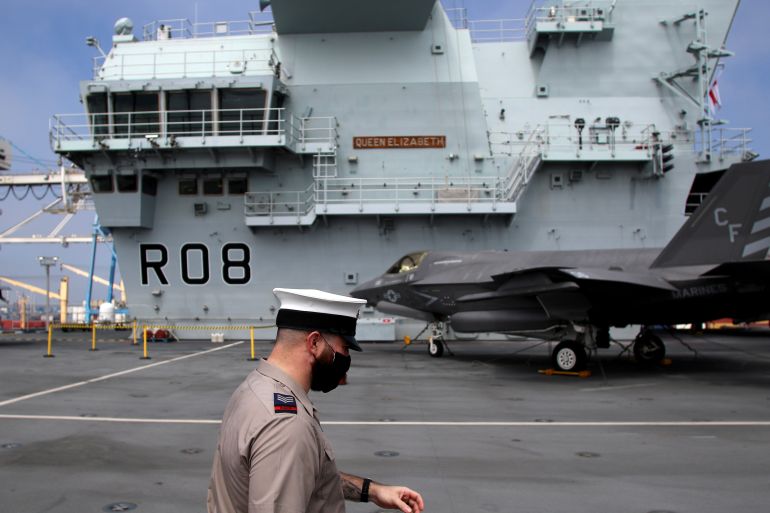UK to permanently deploy two warships in Asia Pacific
Plans for the high-profile visit by the UK carrier strike group come as London deepens security ties with Tokyo amid tensions in the South China Sea.

Britain has announced that it will permanently deploy two warships in Asian waters after its Queen Elizabeth aircraft carrier and escort ships sail to Japan in September through seas where China is vying for influence with the United States and Japan.
Plans for the high-profile visit by the carrier strike group come as the UK deepens security ties with Tokyo, which has expressed growing alarm in recent months over China’s territorial ambitions in the region, including Taiwan.
Keep reading
list of 3 itemsQuad goals: US, Indo-Pacific allies to up India’s vaccine output
Can the Quad effectively counter China’s influence?
“Following on from the strike group’s inaugural deployment, the United Kingdom will permanently assign two ships in the region from later this year,” Britain’s defence minister, Ben Wallace, said in a joint announcement on Tuesday in Tokyo with his Japanese counterpart, Nobuo Kishi.
Kishi echoed Wallace after the two held talks.
“We reconfirmed our shared position that we firmly oppose attempts to change the status quo by coercion, and the importance of a free and open Indo-Pacific based on the rule of law,” he said.
After their arrival in Japan, Kishi said, the Queen Elizabeth and its escort ships will split up for separate port calls to US and Japanese naval bases along the Japanese archipelago.
In a statement on the deployment, a Pentagon spokesperson congratulated Britain for its “commitment to an inter-connected network of allies and partners, who mutually cooperate and support freedom of navigation and a rules-based order in the Indo-Pacific region.”
A close US ally, Japan hosts the biggest concentration of US military forces outside the US, including ships, aircraft and troops.
The British carrier, which is carrying F-35B stealth jets on its maiden voyage, will dock at Yokosuka, the home of Japan’s fleet command and the USS Ronald Reagan, the only forward-deployed US aircraft carrier.
The British ships will not have a permanent base, a spokesperson at the British Embassy in Tokyo said when asked which ports the Royal Navy ships would operate from.
Important news – confirming the UK Carrier Strike Group will operate with the US, Australia, France, Japan, New Zealand & Republic of Korea in the coming months. 🇺🇸🇦🇺🇫🇷🇯🇵🇳🇿🇰🇷 #CSG21
https://t.co/z0Bgzwa0xc— Commander UK Carrier Strike Group (@smrmoorhouse) July 19, 2021
‘Growing regional engagement’
The Queen Elizabeth is being escorted by two destroyers, two frigates, two support vessels and ships from the US and the Netherlands.
It will sail to Japan through the disputed South China Sea, which is claimed all or in part by China and countries in Southeast Asia, with stops in India, Singapore and South Korea.
Wallace said Britain had a “duty” to insist on freedom of navigation on its way to Japan.
In addition, the offshore patrol vessels HMS Spey and HMS Tamar will start a permanent deployment to the region next month, supported by ships from Australia, Japan and Singapore.
In a further sign of Britain’s growing regional engagement, Wallace, who travelled to Japan with a delegation of military commanders, said the UK would also eventually deploy a Littoral Response Group, a unit of marines trained to undertake missions including evacuations and anti-terrorism operations.
China claims sovereignty over most of the South China Sea, angering its regional neighbours and triggering protests further afield including from the US government. Its claim on the so-called “nine-dash line” has also been rejected by the Permanent Court of Arbitration at The Hague as without legal basis.
“It’s no secret that China shadows and challenges ships transiting international waters on very legitimate routes,” Wallace told The Times newspaper in Tokyo.
“We will respect China and we hope that China respects us,” he said, stressing: “We will sail where international law allows.”
Last month, Russia issued strong protests at what it said was a British destroyer’s violation of its territory in the Black Sea.
For all its projections of power, the Royal Navy deployment is not immune to COVID-19. More than 100 of HMS Queen Elizabeth’s 1,600 crew were struck down during a port call in Cyprus earlier this month.
Wallace said the ships will observe strict COVID-19 protocols in Japan and underlined at a news conference the two nations’ shared commitment “to protect rules-based international order”.